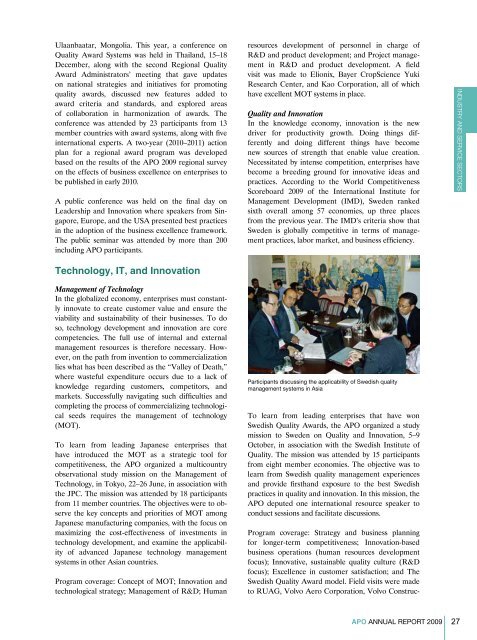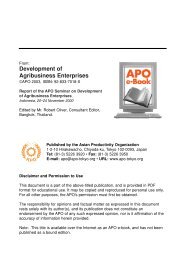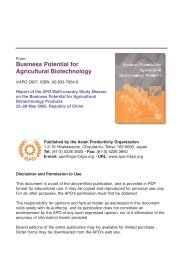Annual Report 2009 - Asian Productivity Organization
Annual Report 2009 - Asian Productivity Organization
Annual Report 2009 - Asian Productivity Organization
You also want an ePaper? Increase the reach of your titles
YUMPU automatically turns print PDFs into web optimized ePapers that Google loves.
Ulaanbaatar, Mongolia. This year, a conference on<br />
Quality Award Systems was held in Thailand, 15–18<br />
December, along with the second Regional Quality<br />
Award Administrators’ meeting that gave updates<br />
on national strategies and initiatives for promoting<br />
quality awards, discussed new features added to<br />
award criteria and standards, and explored areas<br />
of collaboration in harmonization of awards. The<br />
conference was attended by 23 participants from 13<br />
member countries with award systems, along with five<br />
international experts. A two-year (2010–2011) action<br />
plan for a regional award program was developed<br />
based on the results of the APO <strong>2009</strong> regional survey<br />
on the effects of business excellence on enterprises to<br />
be published in early 2010.<br />
A public conference was held on the final day on<br />
Leadership and Innovation where speakers from Singapore,<br />
Europe, and the USA presented best practices<br />
in the adoption of the business excellence framework.<br />
The public seminar was attended by more than 200<br />
including APO participants.<br />
Technology, IT, and Innovation<br />
Management of Technology<br />
In the globalized economy, enterprises must constantly<br />
innovate to create customer value and ensure the<br />
viability and sustainability of their businesses. To do<br />
so, technology development and innovation are core<br />
competencies. The full use of internal and external<br />
management resources is therefore necessary. However,<br />
on the path from invention to commercialization<br />
lies what has been described as the “Valley of Death,”<br />
where wasteful expenditure occurs due to a lack of<br />
knowledge regarding customers, competitors, and<br />
markets. Successfully navigating such difficulties and<br />
completing the process of commercializing technological<br />
seeds requires the management of technology<br />
(MOT).<br />
To learn from leading Japanese enterprises that<br />
have introduced the MOT as a strategic tool for<br />
competitiveness, the APO organized a multicountry<br />
observational study mission on the Management of<br />
Technology, in Tokyo, 22–26 June, in association with<br />
the JPC. The mission was attended by 18 participants<br />
from 11 member countries. The objectives were to observe<br />
the key concepts and priorities of MOT among<br />
Japanese manufacturing companies, with the focus on<br />
maximizing the cost-effectiveness of investments in<br />
technology development, and examine the applicability<br />
of advanced Japanese technology management<br />
systems in other <strong>Asian</strong> countries.<br />
Program coverage: Concept of MOT; Innovation and<br />
technological strategy; Management of R&D; Human<br />
resources development of personnel in charge of<br />
R&D and product development; and Project management<br />
in R&D and product development. A field<br />
visit was made to Elionix, Bayer CropScience Yuki<br />
Research Center, and Kao Corporation, all of which<br />
have excellent MOT systems in place.<br />
Quality and Innovation<br />
In the knowledge economy, innovation is the new<br />
driver for productivity growth. Doing things differently<br />
and doing different things have become<br />
new sources of strength that enable value creation.<br />
Necessitated by intense competition, enterprises have<br />
become a breeding ground for innovative ideas and<br />
practices. According to the World Competitiveness<br />
Scoreboard <strong>2009</strong> of the International Institute for<br />
Management Development (IMD), Sweden ranked<br />
sixth overall among 57 economies, up three places<br />
from the previous year. The IMD’s criteria show that<br />
Sweden is globally competitive in terms of management<br />
practices, labor market, and business efficiency.<br />
Participants discussing the applicability of Swedish quality<br />
management systems in Asia<br />
To learn from leading enterprises that have won<br />
Swedish Quality Awards, the APO organized a study<br />
mission to Sweden on Quality and Innovation, 5–9<br />
October, in association with the Swedish Institute of<br />
Quality. The mission was attended by 15 participants<br />
from eight member economies. The objective was to<br />
learn from Swedish quality management experiences<br />
and provide firsthand exposure to the best Swedish<br />
practices in quality and innovation. In this mission, the<br />
APO deputed one international resource speaker to<br />
conduct sessions and facilitate discussions.<br />
Program coverage: Strategy and business planning<br />
for longer-term competitiveness; Innovation-based<br />
business operations (human resources development<br />
focus); Innovative, sustainable quality culture (R&D<br />
focus); Excellence in customer satisfaction; and The<br />
Swedish Quality Award model. Field visits were made<br />
to RUAG, Volvo Aero Corporation, Volvo Construc-<br />
APO ANNUAL REPORT <strong>2009</strong> 27<br />
INDUSTRY AND SERVICE SECTORS
















